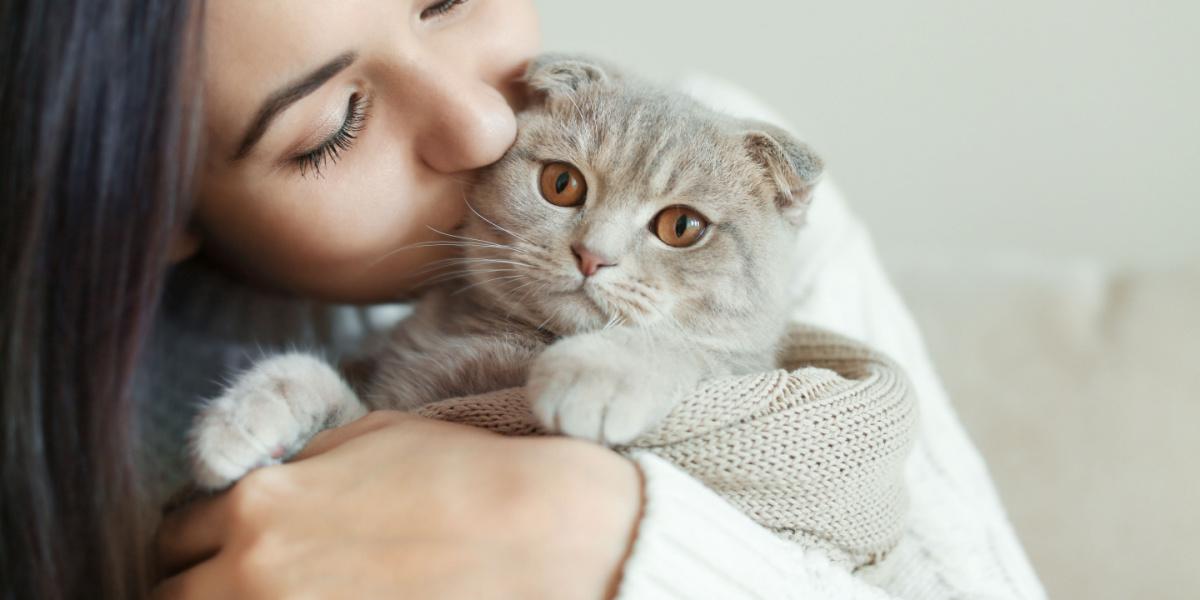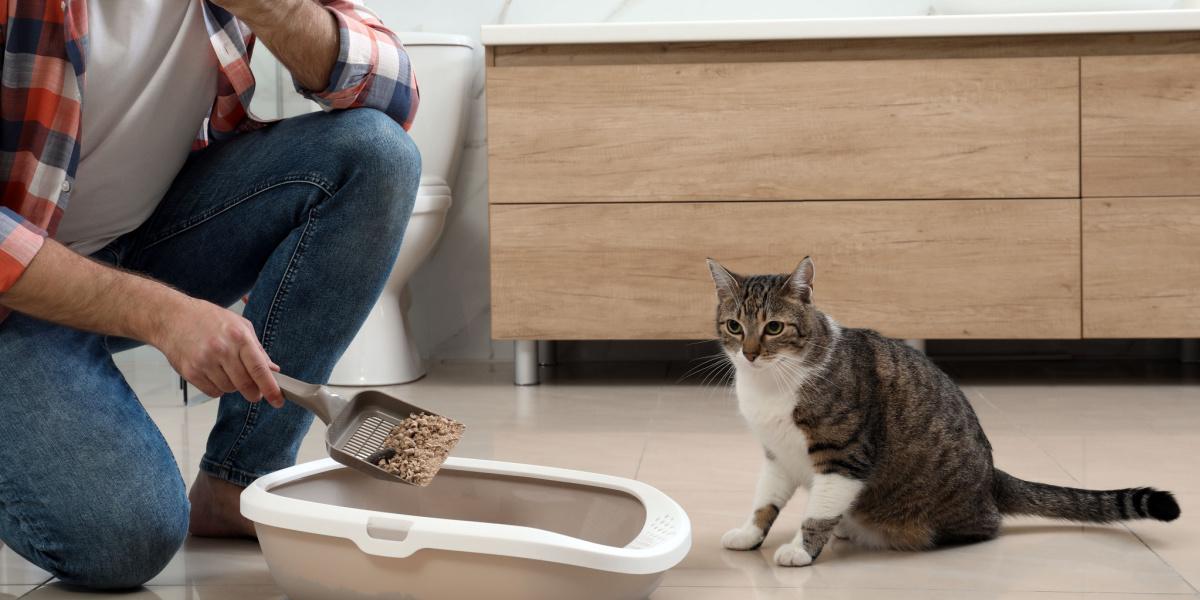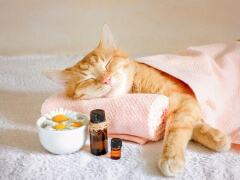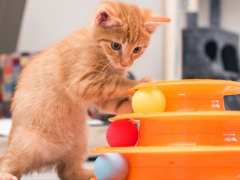
If you’re a cat owner, no matter how much you love cats, you probably don’t want your home to smell like one. Being a pet parent to a cat brings with it inevitable unpleasant odors like cat urine and pet hair.
Key Takeaways
Cat odor can be due to natural pheromones or bodily fluids, but smells can also be caused by health issues like infections and bad teeth.
If it’s not a normal ‘cat smell’, your cat might need treatment from a veterinarian before you try natural methods to remove the smell.
Pet-safe fragrance diffusers and regular cleaning and hoovering should help to reduce the smell around your home.
So, how can you reduce the cat odor in your home? And should you be worried about your cat’s smell? Let’s find out about the natural ways to control pet odor and when the smell might indicate a problem.
Why Do Cats Smell?
Cats smell, it’s a fact of life. However, they shouldn’t smell unpleasant, and as long as you take a few basic measures, they shouldn’t make your home smell unpleasant either. Some cat smells are normal, while others could indicate a health issue. Here are some of the reasons for cat odor in your home:
Pheromones
Cats communicate using smells. When they scratch with their claws, rub against furniture, or knead with their paws, they release pheromones. These kitty smells give other cats information about their age, health, sex, and territory. These feline pheromones are usually hard for humans to detect, but if they build up or you have a particularly sensitive sense of smell you might notice them.
Cat Hair
When dead cat hair builds up on your cat or in the environment it might lead to a smell. This is due to the presence of yeasts and bacteria and other debris on the hair.
Urine
One of the major contributors to unpleasant cat smell is cat urine odor, especially if you have an unneutered male cat. Whether it’s in the litterbox, on the carpet or rug, or in your cat’s fur, urine smell could be the issue.
If your cat is urinating outside the litter box, it can be really distressing for you as a cat owner, but it’s usually for a reason. Cats often change their urination habits when they are stressed or unwell, so ask your veterinarian or a veterinary behaviorist about possible causes.
Feces

A sanitary trim removes excess hair around a cat’s back end so it doesn’t collect pee and poop.
It goes without saying that cat poop smells, so litterboxes and fecal accidents around the house could be the cause of foul smells. However, even if you clean your cat’s poop from the litter tray immediately, if they are longhaired and have feces on their tail or in their fur the smell will persist.
Dental Disease
If your cat has bad breath, it might make your home or the room they’re in smell bad. Many cat owners assume that it’s normal for a cat’s breath to smell, but the smell is usually due to excessive bacteria and dental disease. Other causes of smelly breath include kidney disease, tumors, and wounds in the mouth, so make sure you see a veterinarian if you think your cat’s breath is smelly.
Skin Infections
Yeast and bacteria can cause skin infections which might lead to unpleasant smells. If your cat’s skin looks scurfy, oozy, scabby, or red, they might have a skin infection that’s causing them to smell more.
Abscesses
If your cat has an abscess, which often occurs after altercations with other cats, you might notice a wound or swelling with a scab. The pus within this abscess will smell and could be contributing to those nasty cat smells around your home.
Anal glands
You might be surprised to hear that it’s not just dogs that have anal glands, cats have them too. It’s less common for cats to have problems with their anal glands becoming blocked or full, but when it does happen it can cause an offensive odor.
When Should You Take Your Cat to a Vet?
If your cat’s smell is strong or has changed suddenly, there could be an underlying medical reason. This is especially true if they have other symptoms, like passing urine around the house, straining to urinate, dribbling, scratching, sore skin, or a reduced appetite.
If your cat is well but is choosing to toilet outside the litterbox, they might be stressed, and seeking the advice of your vet or a veterinary behaviorist would be sensible.
Natural Ways to Reduce Unpleasant Cat Odor
1. Neutering
A male cat’s urine has a more potent smell when they are unneutered. This is because their urine contains pheromones intended to attract a female mate and mark their territory. Getting your male cat neutered (castrated) will change the smell of their urine so that it isn’t so unpleasant and intense.
2. Brush Them Regularly
Build up of dead hair is one of the common causes of unpleasant cat smell in the household. To stop the hair from being deposited around your house on your carpets and soft furnishings, try to start a grooming routine when you brush your cat regularly.
3. Keep Their Fur Short Around Their Rear End
To stop urine and feces from contaminating your beautiful longhaired cat’s fur, try keeping their fur short around their back end. This will keep them clean and help to reduce foul smells.
4. Clean Their Litterbox Regularly

Scoop the box at least once a day, and clean it and change the litter weekly.
It might not be your cat that smells, it might just be their litterbox. Keeping their litterbox clean and fresh is important to prevent behavior problems, but don’t overdo it – if the litterbox smells strongly of cleaning chemicals, they might not want to use it either. You can also experiment with different types of cat litter to see which absorbs the smell best.
5. Use a Covered Litterbox
If you’re keeping your cat’s litterbox clean but the smell is still bothering you, you could try a covered litterbox with a cat flap door. This will help to contain the smell, but beware that not all kitties like to feel so restricted when they’re going to the bathroom!
6. Wash Cat Beds, Blankets, and Soft Furnishings Regularly
The fabrics where your cat spends most of their time will become smelly due to the build-up of cat fur, pheromones, and debris. To reduce the smell, make sure you wash these fabrics regularly. Try to avoid using any detergent or fabric sprays that aren’t specifically pet-safe, as you could cause your cat allergies or irritation.
7. Use Pet-Friendly Home Fragrances
Fragrances like reed diffusers or plug-ins can be good at masking the smell of pets. However, they can sometimes irritate the airways and might contain essential oils that are harmful to cats. Unless a product says it is pet-safe it’s not worth taking any risks, so check the label and ingredients carefully. Even if it’s non-toxic, watch out for your cat sneezing or showing signs of breathing distress.
8. Clean Up After Any Accidents

Enzymatic pet cleaners are specially formulated to eliminate all traces of odor.
If your cat vomits or passes urine or feces on the carpet or any other home furnishings, it’s important to clean it as quickly as possible. Absorb any excess with a paper towel or an old rag, then use a pet-safe enzyme cleaner spray bottle and let it soak in. Once the area is clean and dry, you can also sprinkle some bicarbonate (baking soda) to absorb any odors, then hoover it afterward. Always remember to keep your cat away from any areas that you’re treating to prevent harming them.
9. Remove Hair
Hoovering is a crucial part of keeping your home free from pet smells. It might seem like a full-time job, but regular vacuuming will remove pet hair from the environment and keep your home smelling fresh.
Conclusion
It’s not easy to keep your home smelling fresh as a daisy when you own a cat. However, as long as you regularly groom them, use the hoover, and keep their litterbox clean, you shouldn’t be offended by your cat’s smell. Remember that if your cat’s smell is different or unpleasant, it could be a sign of a health problem.
Frequently Asked Questions
How do I get rid of my cat’s pungent smell?
If your cat smells strongly, there could be a health problem like a skin infection or bad teeth, so take them for a check-up at the veterinary clinic. It's also worth increasing your home cleaning routine and dealing with any behavior problems if they're peeing around the house.
How can I make my cat smell good naturally?
Cats naturally have a smell, it’s part of how they communicate. However, ensuring that they have a good diet, keeping their fur short around their bottom, and removing dead hair by brushing might help them to smell better.
How do you make a room not smell like a cat?
Hoovering and washing soft furnishings where the cat sits will help to remove pet hair and other sources of smells. If you decide to use air fresheners or fabric sprays, you should always check that they are not toxic to cats and use them sparingly.







